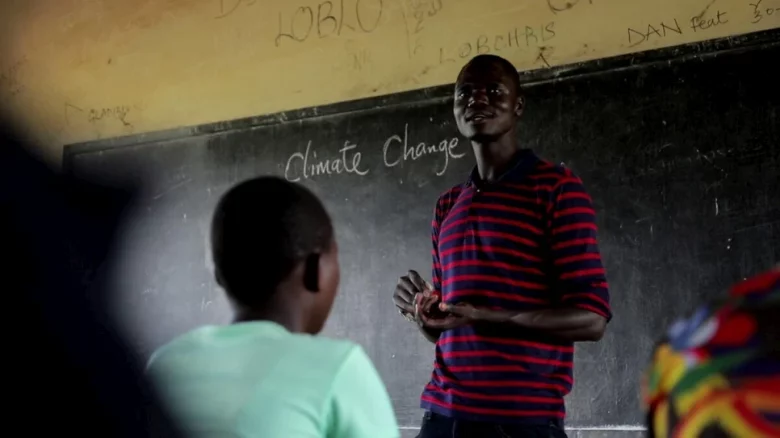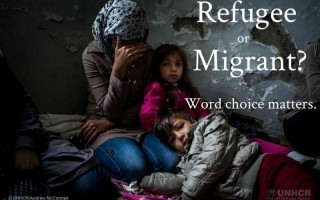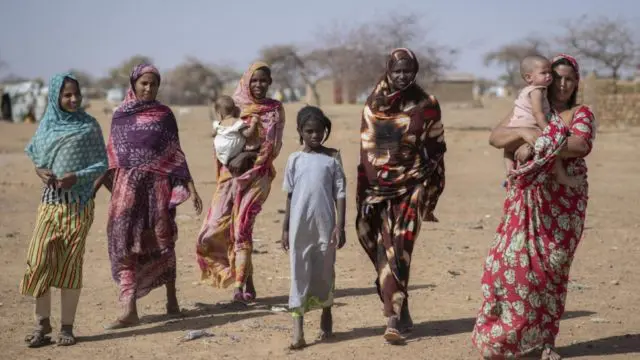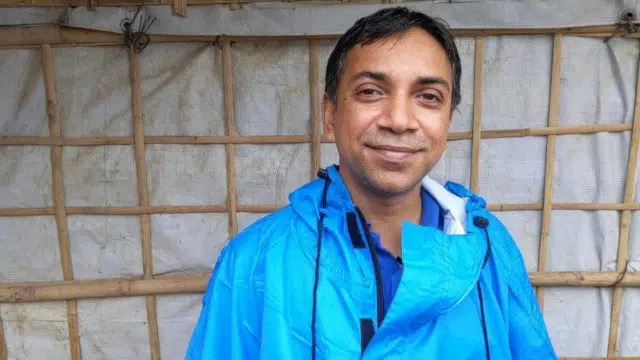From drought and flooding to increasing competition for scarce resources, South Sudanese refugee Opira Bosco Okot knows only too well how the climate crisis has made life harder for displaced people.
By Opira Bosco Okot in Kampala, Uganda

South Sudanese refugee and climate activist Opira Bosco Okot teaches a class on climate change at Paluda Secondary School in Uganda’s Palabek Refugee Settlement. © UNHCR/Francis Mukasa
Opira Bosco Okot, 26, is a South Sudanese refugee in his final year at university in Kampala. He and his family have felt the impacts of the climate crisis in Uganda and at home. Now, he is working with other young people to take action.
In 2017, I ran and walked barefoot for days to flee the conflict in South Sudan. When I arrived at the Ugandan border, I was registered at Palabek Refugee Settlement and allocated a 30-square-metre plot of land on which to build a temporary structure and have some space to farm and rebuild my life.
I started collecting firewood for cooking and cutting trees to build a shelter. The land allotted to me was fertile, forested and bushy; the natural resources were plentiful, and I was easily able to grow sufficient crops, and collect enough firewood for cooking.
But three years later, the rains had become unreliable, crop yields had reduced, and building materials were scarce. The beauty of the area had disappeared, and productive land was increasingly scarce. As drought took hold, competition between refugees and the local host community over increasingly scarce natural resources grew, as well as the perception that refugees were favoured for assistance. The relationship between the two communities began to break down.
One day, while I was in the bush collecting building materials, I was chased by four men and I had to run, leaving behind everything I had collected.
Fellow refugees told me they were being charged higher prices in the local market and that firewood and building materials now had to be acquired at a cost, either monetary or in exchange for labour.
The refugee community has had to devise ways of adapting to this new reality. I asked Amito Rose, my neighbour in the settlement, how she copes. She said: “I have made a mud stove that uses less charcoal. Although charcoal is expensive, I find it easier compared to having to move long distances for firewood.”
Climate change is disrupting weather patterns in Uganda, causing temperature rises and erratic rainfall that is resulting in the loss of crops and livestock, and rising poverty among refugees and their host communities. This is aggravating various other challenges such as crime, children dropping out of school, and rising rates of gender-based violence.
Back in South Sudan, those of my relatives who have returned home are also seeing their living standards deteriorate. Although this is driven by multiple factors, including the impact of the COVID-19 pandemic, economic challenges, and widespread localized violence, extreme weather is also playing a role. In 2021, floods displaced hundreds of thousands of cattle herders from the north-eastern region of the country. They went on to forcefully evict locals in Eastern Equatoria state where my family members were living and growing crops. This resulted in intense conflict and the death of three of my relatives.
Many people are now fleeing due to droughts and floods in different parts of the country. Some of my relatives who had repatriated to South Sudan are now returning to Uganda because they could no longer cultivate their crops.
“I know my intervention will count.”
I am strongly motivated by the climate reality in South Sudan and Uganda. This is why I find it so vital to engage in climate activism to reverse the catastrophe in both places. I know my intervention will count.
In 2021, I founded an organization, The Leads, to respond to the pressing needs of our community. As well as supporting refugee children and youth to stay in school, we are teaching them how they can play a role in protecting the environment, training the community on how to make improved mud stoves that use less charcoal, and promoting tree planting. Now, everyone is aware of the benefits of trees.
To advocate for peaceful coexistence between the refugee and host communities, I produced a video that involved characters from both groups. The screening of the video in both communities incited discussions around interventions for greater cooperation and sharing of resources.
Environmentalists have long taught us how to sustainably coexist with nature without disrupting our food chains. Climate change is caused by human activity, but it should not be a political issue: human lives are at stake. We refugees are struggling to survive every day.
As the international community, governments, NGOs, donors, and humanitarian actors come together at COP27, I call on them to support climate adaptation and mitigation measures and to empower forcibly displaced people and their host communities to combat the climate crisis and restore the environment.
Stepping up to reverse the climate crisis must begin now!
Originally published by UNHCR on 09 November 2022.





